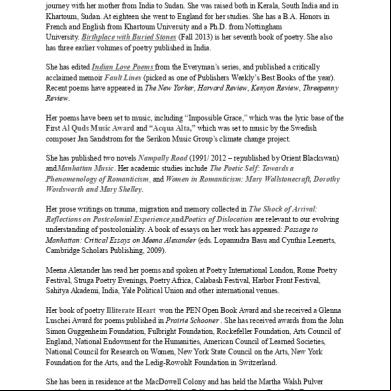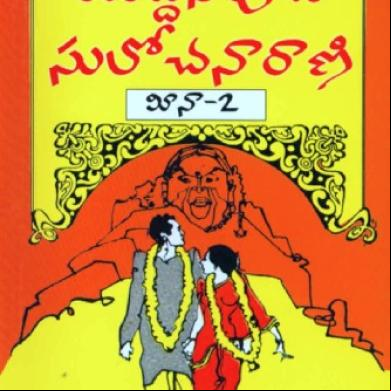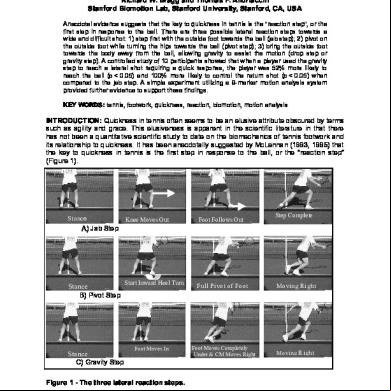Meena Alexander 3c5043
This document was ed by and they confirmed that they have the permission to share it. If you are author or own the copyright of this book, please report to us by using this report form. Report l4457
Overview 6h3y3j
& View Meena Alexander as PDF for free.
More details h6z72
- Words: 1,267
- Pages: 5
Meena Alexander was born in Allahabad, India. She turned five on the Indian Ocean, on the journey with her mother from India to Sudan. She was raised both in Kerala, South India and in Khartoum, Sudan. At eighteen she went to England for her studies. She has a B.A. Honors in French and English from Khartoum University and a Ph.D. from Nottingham University. Birthplace with Buried Stones (Fall 2013) is her seventh book of poetry. She also has three earlier volumes of poetry published in India. She has edited Indian Love Poems from the Everyman’s series, and published a critically acclaimed memoir Fault Lines (picked as one of Publishers Weekly’s Best Books of the year). Recent poems have appeared in The New Yorker, Harvard Review, Kenyon Review, Threepenny Review. Her poems have been set to music, including “Impossible Grace,” which was the lyric base of the First Al Quds Music Award and “Acqua Alta,” which was set to music by the Swedish composer Jan Sandstrom for the Serikon Music Group’s climate change project. She has published two novels Nampally Road (1991/ 2012 – republished by Orient Blackswan) andManhattan Music. Her academic studies include The Poetic Self: Towards a Phenomenology of Romanticism and Women in Romanticism: Mary Wollstonecraft, Dorothy Wordsworth and Mary Shelley. Her prose writings on trauma, migration and memory collected in The Shock of Arrival: Reflections on Postcolonial Experience andPoetics of Dislocation are relevant to our evolving understanding of postcoloniality. A book of essays on her work has appeared: age to Manhattan: Critical Essays on Meena Alexander (eds. Lopamudra Basu and Cynthia Leenerts, Cambridge Scholars Publishing, 2009). Meena Alexander has read her poems and spoken at Poetry International London, Rome Poetry Festival, Struga Poetry Evenings, Poetry Africa, Calabash Festival, Harbor Front Festival, Sahitya Akademi, India, Yale Political Union and other international venues. Her book of poetry Illiterate Heart won the PEN Open Book Award and she received a Glenna Luschei Award for poems published in Prairie Schooner . She has received awards from the John Simon Guggenheim Foundation, Fulbright Foundation, Rockefeller Foundation, Arts Council of England, National Endowment for the Humanities, American Council of Learned Societies, National Council for Research on Women, New York State Council on the Arts, New York Foundation for the Arts, and the Ledig-Rowohlt Foundation in Switzerland. She has been in residence at the MacDowell Colony and has held the Martha Walsh Pulver residency for a poet at Yaddo. She was Visiting Fellow at the Sorbonne (Paris IV); s
Wayland Collegium Lecturer at Brown University; Writer in Residence at the Center for American Culture Studies at Columbia University; University Grants Commission Fellow, Kerala University; Writer in Residence, National University of Singapore, Poet in Residence at the University of Hyderabad, Visiting Professor at the Indian Institute of Advanced Study, Shimla. She has served as a Member of the Jury for the Neustadt International Award in Literature and as an Elector, American Poets Corner, Cathedral of St. John the Divine in New York. She was the recipient of the 2009 Distinguished Achievement Award in Literature from the South Asian Literary Association (an organization allied to the Modern Languages Association) for contributions to American literature. In 2014, Meena Alexander was named a National Fellow at the Indian Institute of Advanced Study. She is Distinguished Professor of English and Women’s Studies at the City University of New York and teaches in the PhD Program in English at CUNY Graduate Center and in the English Department at Hunter College. Meena Alexander is one of the foremost diasporic poets today. Her writing is lyrical, pageant and sensual, dealing with large themes including ethnic intolerance, terrorism, fanaticism and interracial tensions. Her poems are intensely self conscious and with minimum of words, she evokes layers of meaning. For her, poetry has important role to play in modern violence ridden world. She says in an interview with Ruth Maxey in Kenyon Review: “In a time of violence, the task of poetry is in some ways to reconcile us to our world and to allow us a measure of tenderness and grace with which to exist.” Meena Alexander poetry is marked by diasporic sensibility which finds highly emotion, charge expression in sensual, lyrical and metaphoric language. She has undergone multiple identities in multiple places. Her poems express her own lived experiences-uprooting and exile, migrant memories traveling to different places in India, Sudan and America. She has lived in different cities and towns like Allahabad, Tiruvella, Kozencheri, Pune, Khartoum, London, New York, Hyderabad, New Delhi, Trivandrum etc. In a poem Muse, Meena Alexander laments the ruin of 'our language' and the sense of having 'no home'. She says: "Our language is in ruins vowels impossibly sharp broken consonants of bone She has no home". 21 Muse (2) is a poem in sequel to the former poem in which she continues with the same theme. She says: "creatures of here and there we keep scurrying Madurai, Manhattan, who cares? When she turns it is etched on her: Words, sentences, maps, her skin burns bright; Sheer aftermath". 22 Meena Alexander has written several poems on the burden of English and illiteracy in one's own language. In fact, she knew several language Malayalam, Hindi, Arabic, French, and English but she always felt that English had alienated her
from what she was born to; the language of intimacy. When she was working at the Central Institute of English at Hyderabad, there were lots of discussion and debate about the status of English in India. It was argued that English was superior to any other Indian language as it could be a powerful medium for technical knowledge and modern science and commerce. However, everyone felt that the future of English depends upon its ability to the needs of the masses in India. From Susie Tharu who had been her close friend, Meena Alexander learnt about the strength of femaleness, resistance and possibility of political activism. Jayanth Mahapatra, the famous Indian English poet from Orissa taught her to understand the poet's bond with place and how to accept the ravages of time. She always felt that Page 125 colonialism was quite intrinsic to the burden of English in India. She too felt that she was robbed of literacy in her own mother tongue. She feels that multiple speeches surround her making her dream of barbed wire. Muse Meena Alexander, 1951 I was young when you came to me. Each thing rings its turn, you sang in my ear, a slip of a thing dressed like a convent girl-white socks, shoes, dark blue pinafore, white blouse.
A pencil box in hand: girl, book, tree-those were the words you gave me. Girl was penne, hair drawn back, gleaming on the scalp, the self in a mirror in a rosewood room the sky at monsoon time, pearl slits
In cloud cover, a jagged music pours: gash of sense, raw covenant clasped still in a gold bound book, pusthakam pages parted, ink rubbed with mist, a bird might have dreamt its shadow there
spreading fire in a tree maram. You murmured the word, sliding it on your tongue, trying to get how a girl could turn into a molten thing and not burn. Centuries later worn out from travel I rest under a tree.
You come to me a bird shedding gold feathers, each one a quill scraping my tympanum. You set a book to my ribs. Night after night I unclasp it at the mirror’s edge
alphabets flicker and soar. Write in the light of all the languages you know the earth contains, you murmur in my ear. This is pure transport.
Wayland Collegium Lecturer at Brown University; Writer in Residence at the Center for American Culture Studies at Columbia University; University Grants Commission Fellow, Kerala University; Writer in Residence, National University of Singapore, Poet in Residence at the University of Hyderabad, Visiting Professor at the Indian Institute of Advanced Study, Shimla. She has served as a Member of the Jury for the Neustadt International Award in Literature and as an Elector, American Poets Corner, Cathedral of St. John the Divine in New York. She was the recipient of the 2009 Distinguished Achievement Award in Literature from the South Asian Literary Association (an organization allied to the Modern Languages Association) for contributions to American literature. In 2014, Meena Alexander was named a National Fellow at the Indian Institute of Advanced Study. She is Distinguished Professor of English and Women’s Studies at the City University of New York and teaches in the PhD Program in English at CUNY Graduate Center and in the English Department at Hunter College. Meena Alexander is one of the foremost diasporic poets today. Her writing is lyrical, pageant and sensual, dealing with large themes including ethnic intolerance, terrorism, fanaticism and interracial tensions. Her poems are intensely self conscious and with minimum of words, she evokes layers of meaning. For her, poetry has important role to play in modern violence ridden world. She says in an interview with Ruth Maxey in Kenyon Review: “In a time of violence, the task of poetry is in some ways to reconcile us to our world and to allow us a measure of tenderness and grace with which to exist.” Meena Alexander poetry is marked by diasporic sensibility which finds highly emotion, charge expression in sensual, lyrical and metaphoric language. She has undergone multiple identities in multiple places. Her poems express her own lived experiences-uprooting and exile, migrant memories traveling to different places in India, Sudan and America. She has lived in different cities and towns like Allahabad, Tiruvella, Kozencheri, Pune, Khartoum, London, New York, Hyderabad, New Delhi, Trivandrum etc. In a poem Muse, Meena Alexander laments the ruin of 'our language' and the sense of having 'no home'. She says: "Our language is in ruins vowels impossibly sharp broken consonants of bone She has no home". 21 Muse (2) is a poem in sequel to the former poem in which she continues with the same theme. She says: "creatures of here and there we keep scurrying Madurai, Manhattan, who cares? When she turns it is etched on her: Words, sentences, maps, her skin burns bright; Sheer aftermath". 22 Meena Alexander has written several poems on the burden of English and illiteracy in one's own language. In fact, she knew several language Malayalam, Hindi, Arabic, French, and English but she always felt that English had alienated her
from what she was born to; the language of intimacy. When she was working at the Central Institute of English at Hyderabad, there were lots of discussion and debate about the status of English in India. It was argued that English was superior to any other Indian language as it could be a powerful medium for technical knowledge and modern science and commerce. However, everyone felt that the future of English depends upon its ability to the needs of the masses in India. From Susie Tharu who had been her close friend, Meena Alexander learnt about the strength of femaleness, resistance and possibility of political activism. Jayanth Mahapatra, the famous Indian English poet from Orissa taught her to understand the poet's bond with place and how to accept the ravages of time. She always felt that Page 125 colonialism was quite intrinsic to the burden of English in India. She too felt that she was robbed of literacy in her own mother tongue. She feels that multiple speeches surround her making her dream of barbed wire. Muse Meena Alexander, 1951 I was young when you came to me. Each thing rings its turn, you sang in my ear, a slip of a thing dressed like a convent girl-white socks, shoes, dark blue pinafore, white blouse.
A pencil box in hand: girl, book, tree-those were the words you gave me. Girl was penne, hair drawn back, gleaming on the scalp, the self in a mirror in a rosewood room the sky at monsoon time, pearl slits
In cloud cover, a jagged music pours: gash of sense, raw covenant clasped still in a gold bound book, pusthakam pages parted, ink rubbed with mist, a bird might have dreamt its shadow there
spreading fire in a tree maram. You murmured the word, sliding it on your tongue, trying to get how a girl could turn into a molten thing and not burn. Centuries later worn out from travel I rest under a tree.
You come to me a bird shedding gold feathers, each one a quill scraping my tympanum. You set a book to my ribs. Night after night I unclasp it at the mirror’s edge
alphabets flicker and soar. Write in the light of all the languages you know the earth contains, you murmur in my ear. This is pure transport.










